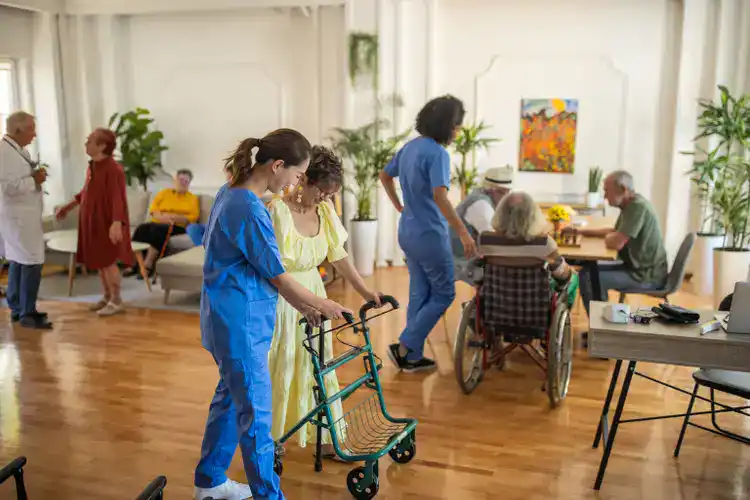The global landscape is undergoing a profound demographic shift, with populations aging at an unprecedented rate. This phenomenon, often termed the “silver tsunami,” is not confined to Western nations but is increasingly evident across the Arab world. As life expectancy rises and fertility rates decline, the proportion of elderly individuals in society is expanding rapidly. This demographic transformation presents both challenges and significant opportunities, particularly within the real estate sector, making Senior Housing Real Estate Investment Trusts (REITs) a compelling and increasingly relevant investment vehicle for the Arab population.
Understanding Senior Housing REITs
Before delving into the interplay of demographics, it’s crucial to understand what Senior Housing REITs are. A REIT, or Real Estate Investment Trust, is a company that owns, operates, or finances income-producing real estate. Often likened to mutual funds for real estate, REITs allow individual investors to buy shares in commercial real estate portfolios, which can include apartments, office buildings, shopping centers, and, in this specific case, senior living facilities.

Senior Housing REITs specialize in properties catering to the elderly population. These can range from independent living communities for active seniors, offering amenities and social activities, to assisted living facilities providing daily care and support, and even specialized memory care units for individuals with cognitive impairments. The revenue generated by these REITs primarily comes from rents and fees paid by residents.
Investing in Senior Housing REITs offers several advantages:
- Liquidity: Unlike direct property ownership, REIT shares are traded on major stock exchanges, providing investors with greater flexibility to buy and sell.
- Diversification: REITs typically hold a portfolio of properties across various locations and types, reducing investment risk compared to owning a single asset.
- Regular Income: By law, REITs are generally required to distribute a significant portion (often 90% or more) of their taxable income to shareholders as dividends, offering a consistent income stream.
- Professional Management: REITs are managed by experienced real estate professionals, alleviating the burden of direct property management for investors.
- Inflation Hedge: Real estate, including senior housing, can act as a hedge against inflation, as property values and rental income tend to increase with rising prices.
The Accelerating Demographic Shift in the Arab World
For decades, the Arab region was characterized by a young and rapidly growing population. However, this demographic pyramid is now undergoing a significant reshaping. The number of individuals aged 65 and above in the Arab region is projected to surge significantly by 2050. This represents a monumental increase that will have profound economic and social implications.
Several factors contribute to this accelerating aging trend:
- Increased Life Expectancy: Improvements in healthcare, sanitation, and living standards have led to a significant increase in life expectancy across most Arab countries. People are simply living longer, healthier lives.
- Declining Fertility Rates: While still relatively higher than in many Western nations, fertility rates in the Arab world have been steadily declining. This means fewer young people are entering the population, further shifting the age distribution towards older demographics.
- Advancements in Medical Care: The availability of advanced medical treatments and preventative care prolongs lives, leading to a larger cohort of older adults with varying healthcare needs.
- Changing Societal Structures: While traditional family structures in the Arab world have historically provided extensive care for elderly relatives, urbanization, smaller family sizes, and increased female participation in the workforce are gradually altering this dynamic. This creates a growing need for formal, professional senior care services.
Implications for Senior Housing Demand
The implications of this demographic shift for senior housing demand are substantial. As the elderly population grows, so does the need for specialized living environments that cater to their unique requirements. This goes beyond just providing a roof over their heads; it encompasses a holistic approach to well-being, including:
- Healthcare Services: Access to medical professionals, nursing care, and specialized clinics within or near senior living communities will become paramount.
- Personalized Care: Assisted living facilities offer support with daily activities such as bathing, dressing, and medication management, a necessity for a growing segment of the elderly.
- Social Engagement: Independent living communities provide opportunities for social interaction, recreational activities, and a sense of community, combating loneliness and promoting mental well-being.
- Memory Care: As the prevalence of age-related cognitive disorders increases, the demand for specialized memory care units designed for individuals with Alzheimer’s and dementia will rise significantly.
- Accessibility and Safety: Properties designed with features like no-step entries, wider hallways, grab bars, and emergency response systems are crucial for ensuring the safety and independence of older residents.
- Culturally Sensitive Environments: For the Arab population, senior housing facilities that understand and cater to cultural nuances, including dietary preferences (halal food), religious practices, and social customs, will be highly valued.
Opportunities for Senior Housing REITs in the Arab Region
The burgeoning elderly population in the Arab world, coupled with evolving societal dynamics, presents a nascent yet immensely promising market for Senior Housing REITs. Currently, the concept of dedicated senior living communities is not as widespread as in some Western countries, with informal family care still predominant. However, this is changing, and the demand for formal senior housing is set to explode.
- Untapped Market Potential: The Arab region represents a largely undeveloped market for institutional-grade senior housing. This offers early movers significant opportunities to establish strong market positions and capture a substantial share of future demand.
- Government Initiatives and Visionary Projects: Many Arab governments, particularly in the GCC, are actively pursuing economic diversification and social development initiatives. This includes investing in healthcare infrastructure and improving the quality of life for all citizens, which could encompass supporting the development of modern senior living solutions.
- High Net-Worth Individuals and Growing Middle Class: The Arab world is home to a substantial number of high-net-worth individuals and a rapidly expanding middle class. These segments of the population are increasingly seeking premium, high-quality care options for their aging parents and relatives, aligning with the offerings of well-managed senior housing facilities.
- Demand for Specialized Healthcare Real Estate: Beyond direct housing, the aging population will drive demand for other healthcare-related real estate, such as medical office buildings (MOBs), outpatient clinics, and rehabilitation centers, which can also be part of a broader healthcare REIT portfolio.
- Potential for Shariah-Compliant Structures: For investors in the Arab world, adherence to Islamic finance principles is paramount. Senior Housing REITs can be structured to be Shariah-compliant, avoiding interest-based financing (riba) and investing in properties that generate income from permissible activities. This involves using Islamic financing models like Ijara (leasing) or Musharakah (partnership) and ensuring that the underlying businesses operating within the senior housing facilities are also Shariah-compliant. This aspect is crucial for attracting a broader base of Muslim investors.
Challenges and Considerations
While the opportunities are compelling, investors in Senior Housing REITs in the Arab region must also be cognizant of potential challenges:
- Cultural Sensitivities: Shifting from traditional family-based care to institutional senior living requires a significant cultural adjustment. REITs must invest in understanding and respecting local customs and preferences to gain acceptance and trust within communities.
- Regulatory Frameworks: The regulatory landscape for senior housing and healthcare facilities may still be developing in some Arab countries. Clear and supportive regulations are essential for long-term growth and investor confidence.
- Talent Acquisition and Training: Staffing senior living facilities with qualified and compassionate caregivers is crucial. There may be a need for robust training programs to develop a skilled workforce tailored to the specific needs of elderly residents in the region.
- Development and Operational Costs: Building and operating high-quality senior housing facilities can be capital-intensive. REITs need to ensure efficient operations and sustainable business models to generate attractive returns.
- Limited Historical Data: Unlike mature markets, the Arab region has limited historical data on senior housing performance, which can make financial projections and risk assessment more challenging.
- Interest Rate Fluctuations: Like all real estate investments, Senior Housing REITs are sensitive to interest rate changes. Rising interest rates can increase borrowing costs and impact profitability.
The Road Ahead: A Vision for Sustainable Senior Living
The demographic trends in the Arab world undeniably point towards a significant and growing demand for senior housing. Senior Housing REITs are uniquely positioned to capitalize on this megatrend, offering a structured, diversified, and potentially Shariah-compliant avenue for investors to participate in this evolving sector.
For the successful development of this market, collaboration between various stakeholders will be key:
- Governments: Implementing clear regulatory frameworks, offering incentives for development, and investing in supporting infrastructure.
- Private Developers and Operators: Designing and managing culturally sensitive facilities, offering a high standard of care, and integrating with local communities.
- Investors: Providing the necessary capital through REITs and other investment vehicles, with a focus on long-term growth and sustainable returns.
- Healthcare Providers: Integrating medical and wellness services seamlessly into senior living environments.
As the Arab world continues its journey of modernization and development, the focus on providing dignified and high-quality care for its aging population will become increasingly important. Senior Housing REITs, with their ability to pool capital, offer diversification, and provide professional management, are poised to play a pivotal role in shaping the future of senior living in the region, creating not just investment opportunities but also contributing significantly to the social fabric and well-being of its people. The “silver tsunami” is not a threat, but rather an opportunity for innovation, investment, and a compassionate approach to aging.










